介词用法归纳
介词的用法归纳详细
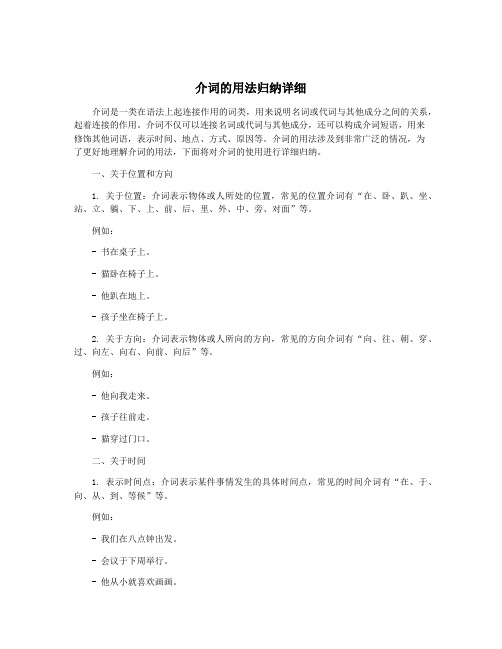
介词的用法归纳详细介词是一类在语法上起连接作用的词类,用来说明名词或代词与其他成分之间的关系,起着连接的作用。
介词不仅可以连接名词或代词与其他成分,还可以构成介词短语,用来修饰其他词语,表示时间、地点、方式、原因等。
介词的用法涉及到非常广泛的情况,为了更好地理解介词的用法,下面将对介词的使用进行详细归纳。
一、关于位置和方向1. 关于位置:介词表示物体或人所处的位置,常见的位置介词有“在、卧、趴、坐、站、立、躺、下、上、前、后、里、外、中、旁、对面”等。
例如:- 书在桌子上。
- 猫卧在椅子上。
- 他趴在地上。
- 孩子坐在椅子上。
2. 关于方向:介词表示物体或人所向的方向,常见的方向介词有“向、往、朝、穿、过、向左、向右、向前、向后”等。
例如:- 他向我走来。
- 孩子往前走。
- 猫穿过门口。
二、关于时间1. 表示时间点:介词表示某件事情发生的具体时间点,常见的时间介词有“在、于、向、从、到、等候”等。
例如:- 我们在八点钟出发。
- 会议于下周举行。
- 他从小就喜欢画画。
2. 表示时间段:介词表示某个动作或状态持续的一段时间,常见的时间段介词有“在、经过、过、自、到、等待”等。
例如:- 我们在早上九点至十二点之间上课。
- 经过几天的思考,他做出了决定。
- 我等了一个小时。
三、表达原因1. 表示原因:介词表示某个事情的原因或理由,常见的原因介词有“因为、由于、为了、关于”等。
例如:- 他因为生病而没有来上课。
- 由于下雨,他没有出去跑步。
- 我们为了庆祝活动,做了一些准备工作。
四、服务于动词1. 与动词连用:介词可以用来构成动词短语,与动词连用,表示动作的对象、方式或结果。
例如:- 我对这个问题感到困惑。
- 他们一起工作。
- 她因为生病而错过了比赛。
五、其它用法1. 表示比较:介词可以用来表示两者之间的比较,表示程度或差异。
例如:- 这个城市比那个城市发达。
- 她比我更有耐心。
2. 表示方式:介词可以表示某种方式,方法或手段。
高中介词的用法归纳

高中介词的用法归纳一、介词的分类1、时间介词at:用于具体的时刻,如 at six o'clock。
in:用于较长的时间段,如 in the morning,in May,in 2023。
on:用于具体的日期或星期几,如 on Monday,on May 1st。
during:在期间,强调一段时间的过程,如 during the summer vacation。
for:表示持续的时间,如 for two hours。
since:自从以来,常用于现在完成时,如 since 2010。
until / till:直到,如 I will wait until you come2、地点介词at:用于较小的地点,如 at the bus stop。
in:用于较大的地点,如 in Beijing,in the room。
on:在上面,与表面有接触,如 on the table。
above:在上方,不接触表面,如 The plane is flying above the cloudsover:在正上方,垂直上方,如 There is a bridge over the river under:在下面,如 The cat is under the chairbelow:在下方,不一定垂直,如 The temperature is below zero between:在之间(两者),如 between A and B。
among:在之间(三者或三者以上),如 among the students。
3、方式介词by:通过方式,如 by bike,by bus。
with:使用工具,如 with a pen,with my hands。
in:用语言,如 in English,in Chinese。
4、其他常见介词of:的,如 a map of China。
to:朝,向,如 go to school。
from:从,如 from Beijing to Shanghai。
超全的英语介词用法归纳总结
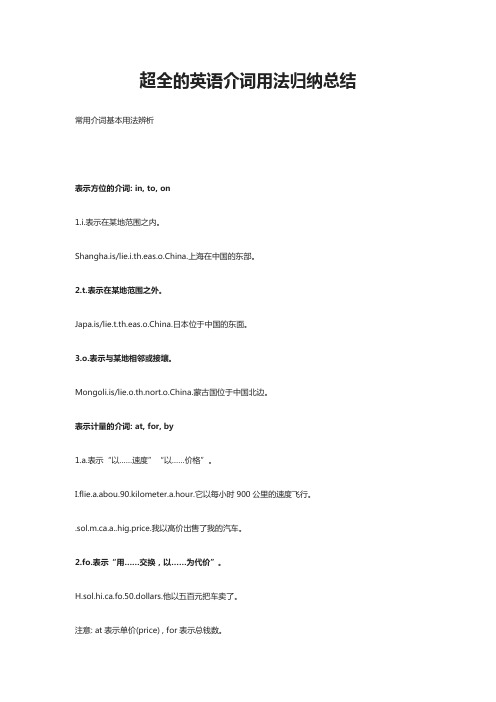
超全的英语介词用法归纳总结常用介词基本用法辨析表示方位的介词: in, to, on1.i.表示在某地范围之内。
Shangha.is/lie.i.th.eas.o.China.上海在中国的东部。
2.t.表示在某地范围之外。
Japa.is/lie.t.th.eas.o.China.日本位于中国的东面。
3.o.表示与某地相邻或接壤。
Mongoli.is/lie.o.th.nort.o.China.蒙古国位于中国北边。
表示计量的介词: at, for, by1.a.表示“以……速度”“以……价格”。
I.flie.a.abou.90.kilometer.a.hour.它以每小时900公里的速度飞行。
.sol.m.ca.a..hig.price.我以高价出售了我的汽车。
2.fo.表示“用……交换,以……为代价”。
H.sol.hi.ca.fo.50.dollars.他以五百元把车卖了。
注意: at表示单价(price) , for表示总钱数。
3.b.表示“以……计”, 后跟度量单位。
The.pai.hi.b.th.month.他们按月给他计酬。
Her.egg.ar.sol.b.weight.在这里鸡蛋是按重量卖的。
表示材料的介词: of, from, in1.o.成品仍可看出原料。
Thi.bo.i.mad.o.paper.这个盒子是纸做的。
2.fro.成品已看不出原料。
Win.i.mad.fro.grapes.葡萄酒是葡萄酿成的。
3.i.表示用某种材料或语言。
Pleas.fil.i.th.for.i.penci.first.请先用铅笔填写这个表格。
The.tal.i.English.他们用英语交谈。
表示工具或手段的介词: by, with, on1.b.用某种方式, 多用于交通。
.wen.ther.b.bus.我坐公共汽车去那儿。
2.with表示“用某种工具”。
H.brok.th.windo.wit..stone.他用石头把玻璃砸坏了。
介词的用法归纳
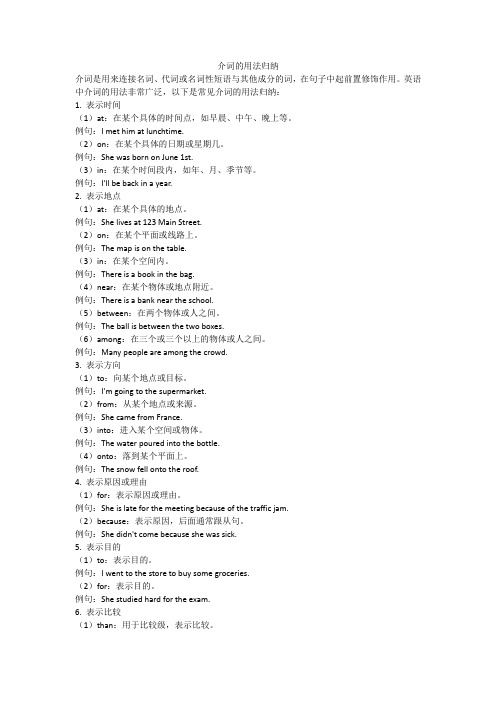
介词的用法归纳介词是用来连接名词、代词或名词性短语与其他成分的词,在句子中起前置修饰作用。
英语中介词的用法非常广泛,以下是常见介词的用法归纳:1. 表示时间(1)at:在某个具体的时间点,如早晨、中午、晚上等。
例句:I met him at lunchtime.(2)on:在某个具体的日期或星期几。
例句:She was born on June 1st.(3)in:在某个时间段内,如年、月、季节等。
例句:I'll be back in a year.2. 表示地点(1)at:在某个具体的地点。
例句:She lives at 123 Main Street.(2)on:在某个平面或线路上。
例句:The map is on the table.(3)in:在某个空间内。
例句:There is a book in the bag.(4)near:在某个物体或地点附近。
例句:There is a bank near the school.(5)between:在两个物体或人之间。
例句:The ball is between the two boxes.(6)among:在三个或三个以上的物体或人之间。
例句:Many people are among the crowd.3. 表示方向(1)to:向某个地点或目标。
例句:I'm going to the supermarket.(2)from:从某个地点或来源。
例句:She came from France.(3)into:进入某个空间或物体。
例句:The water poured into the bottle.(4)onto:落到某个平面上。
例句:The snow fell onto the roof.4. 表示原因或理由(1)for:表示原因或理由。
例句:She is late for the meeting because of the traffic jam.(2)because:表示原因,后面通常跟从句。
史上超全的英语介词用法归纳总结!不看太可惜了
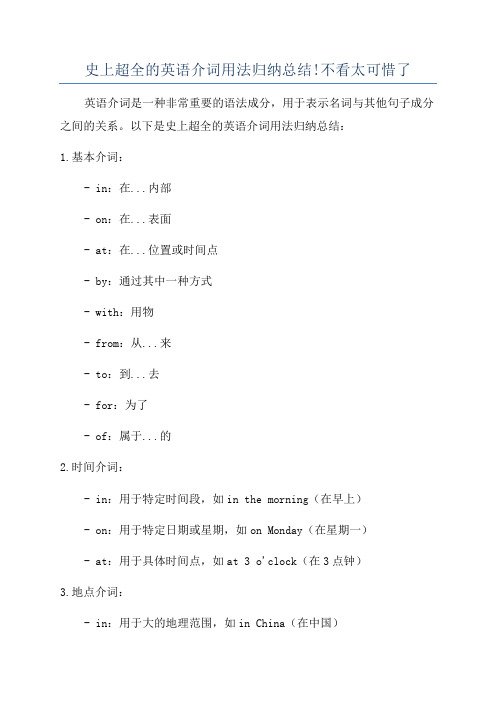
史上超全的英语介词用法归纳总结!不看太可惜了英语介词是一种非常重要的语法成分,用于表示名词与其他句子成分之间的关系。
以下是史上超全的英语介词用法归纳总结:1.基本介词:- in:在...内部- on:在...表面- at:在...位置或时间点- by:通过其中一种方式- with:用物- from:从...来- to:到...去- for:为了- of:属于...的2.时间介词:- in:用于特定时间段,如in the morning(在早上)- on:用于特定日期或星期,如on Monday(在星期一)- at:用于具体时间点,如at 3 o'clock(在3点钟)3.地点介词:- in:用于大的地理范围,如in China(在中国)- on:用于较小的地理范围或表面,如on the street(在街上)- at:用于具体地点,如at the supermarket(在超市)4.方向介词:- to:表示到达一些地方,如go to school(去学校)- into:表示进入一些地方,如go into the house(进入房子)- out of:表示离开一些地方,如get out of the car(离开车)5.原因介词:- because of:由于,如He is late because of the traffic(他因为交通堵塞而迟到)- due to:由于,如The flight was canceled due to bad weather(因为恶劣天气,航班被取消)6.动词短语介词:- look after:照顾,如She looks after her younger brother (她照顾她的弟弟)- take care of:照顾,如He takes care of his plants(他照顾他的植物)7.形容词短语介词:- interested in:对...感兴趣,如She is interested in music (她对音乐感兴趣)- good at:擅长...,如He is good at playing basketball(他擅长打篮球)8.其他常见介词用法:- with regard to:关于,如With regard to the matter, I have something to say(关于这件事,我有些话要说)- instead of:代替,如I will go instead of him(我将代替他去)- according to:根据,如According to the weather forecast, it will rain tomorrow(根据天气预报,明天会下雨)以上是一些常见的英语介词用法总结,希望能帮到你!。
介词的用法归纳有哪些需要注意的
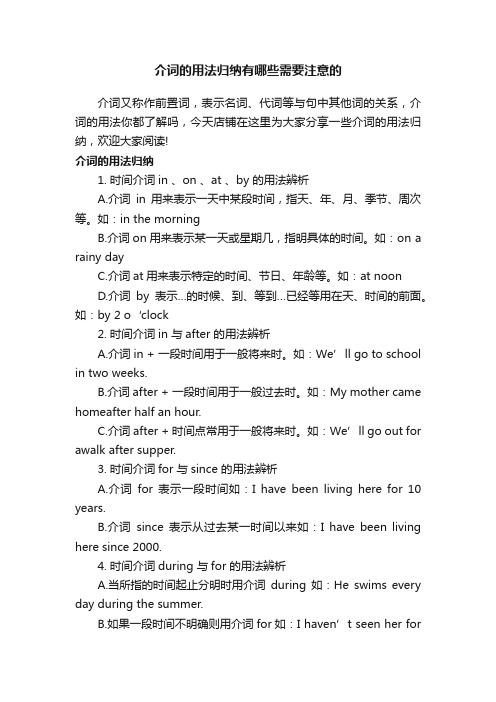
介词的用法归纳有哪些需要注意的介词又称作前置词,表示名词、代词等与句中其他词的关系,介词的用法你都了解吗,今天店铺在这里为大家分享一些介词的用法归纳,欢迎大家阅读!介词的用法归纳1. 时间介词in 、on 、at 、by 的用法辨析A.介词in用来表示一天中某段时间,指天、年、月、季节、周次等。
如:in the morningB.介词on用来表示某一天或星期几,指明具体的时间。
如:on a rainy dayC.介词at用来表示特定的时间、节日、年龄等。
如:at noonD.介词by表示…的时候、到、等到…已经等用在天、时间的前面。
如:by 2 o‘clock2. 时间介词in 与after 的用法辨析A.介词in + 一段时间用于一般将来时。
如:We’ll go to school in two weeks.B.介词after + 一段时间用于一般过去时。
如:My mother came homeafter half an hour.C.介词after + 时间点常用于一般将来时。
如:We’ll go out for awalk after supper.3. 时间介词for 与since 的用法辨析A.介词for 表示一段时间如:I have been living here for 10 years.B.介词since 表示从过去某一时间以来如:I have been living here since 2000.4. 时间介词during 与for 的用法辨析A.当所指的时间起止分明时用介词during如:He swims every day during the summer.B.如果一段时间不明确则用介词for如:I haven’t seen her foryears.5. 时间介词before 与by 的用法辨析A.介词before表示“在…之前”如:He won’t come back before five .B.介词by表示“到…时为止,不迟于…”如:The work must be finished by Friday.6. 时间介词till 与until 用法的异同A.till和until用在肯定句中,均可表示“直到…为止”,如:I will wait till(until)seveno'clock.B.till和until用在否定句中,均可表示“在…以前”或“直到…才”。
(完整word版)介词用法归纳,推荐文档
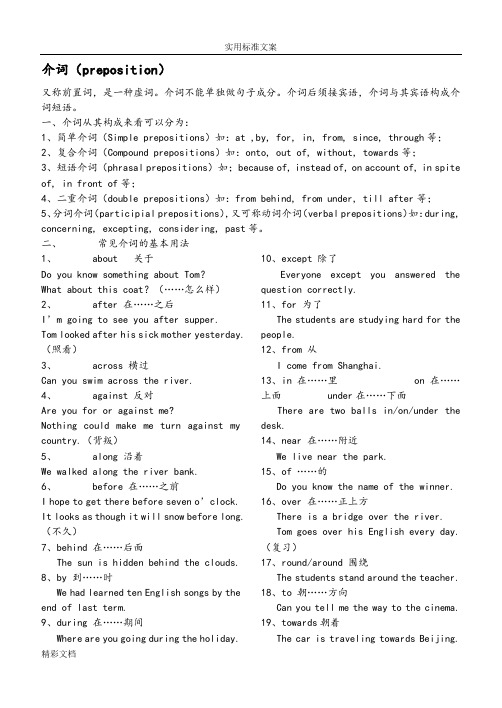
介词(preposition)又称前置词,是一种虚词。
介词不能单独做句子成分。
介词后须接宾语,介词与其宾语构成介词短语。
一、介词从其构成来看可以分为:1、简单介词(Simple prepositions)如:at ,by, for, in, from, since, through等;2、复合介词(Compound prepositions)如:onto, out of, without, towards等;3、短语介词(phrasal prepositions)如;because of, instead of, on account of, in spite of, in front of等;4、二重介词(double prepositions)如:from behind, from under, till after等;5、分词介词(participial prepositions),又可称动词介词(verbal prepositions)如:during, concerning, excepting, considering, past等。
二、常见介词的基本用法1、 about 关于Do you know something about Tom?What about this coat?(……怎么样)2、 after 在……之后I’m going to see you after supper. Tom looked after his sick mother yesterday.(照看)3、 across 横过Can you swim across the river.4、 against 反对Are you for or against me?Nothing could make me turn against my country.(背叛)5、 along 沿着We walked along the river bank.6、 before 在……之前I hope to get there before seven o’clock. It looks as though it will snow before long.(不久)7、behind 在……后面The sun is hidden behind the clouds.8、by 到……时We had learned ten English songs by the end of last term.9、during 在……期间Where are you going during the holiday. 10、except 除了Everyone except you answered the question correctly.11、for 为了The students are studying hard for the people.12、from 从I come from Shanghai.13、in 在……里 on 在……上面 under在……下面There are two balls in/on/under the desk.14、near 在……附近We live near the park.15、of ……的Do you know the name of the winner.16、over 在……正上方There is a bridge over the river.Tom goes over his English every day.(复习)17、round/around 围绕The students stand around the teacher.18、to 朝……方向Can you tell me the way to the cinema.19、towards朝着The car is traveling towards Beijing.20、with 和……一起me?Would you like to go to the cinema with学习这些介词时可以先记住它的汉语意思,然后参照例句来加深理解,并在今后的学习中加以灵活运用。
英语介词的用法归纳
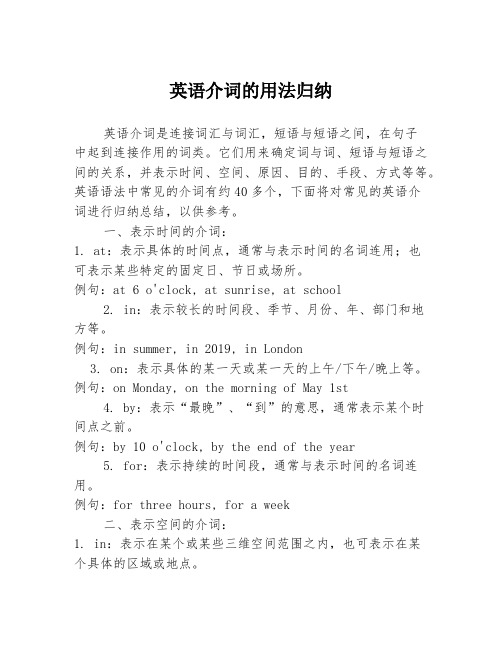
英语介词的用法归纳英语介词是连接词汇与词汇,短语与短语之间,在句子中起到连接作用的词类。
它们用来确定词与词、短语与短语之间的关系,并表示时间、空间、原因、目的、手段、方式等等。
英语语法中常见的介词有约40多个,下面将对常见的英语介词进行归纳总结,以供参考。
一、表示时间的介词:1. at:表示具体的时间点,通常与表示时间的名词连用;也可表示某些特定的固定日、节日或场所。
例句:at 6 o'clock, at sunrise, at school2. in:表示较长的时间段、季节、月份、年、部门和地方等。
例句:in summer, in 2019, in London3. on:表示具体的某一天或某一天的上午/下午/晚上等。
例句:on Monday, on the morning of May 1st4. by:表示“最晚”、“到”的意思,通常表示某个时间点之前。
例句:by 10 o'clock, by the end of the year5. for:表示持续的时间段,通常与表示时间的名词连用。
例句:for three hours, for a week二、表示空间的介词:1. in:表示在某个或某些三维空间范围之内,也可表示在某个具体的区域或地点。
例句:in the room, in the park2. on:表示在某个平面面上,通常用来表示地点。
例句:on the table, on the wall3. at:表示在某个具体的地点或位置。
例句:at the door, at the bus stop4. by:表示“靠近”、“经过”等含义。
例句:by the river, by the window5. between:表示在两个或两个以上的物体或位置之间。
例句:between two mountains, between the buildings6. among:表示在三个或三个以上的物体或位置之间。
- 1、下载文档前请自行甄别文档内容的完整性,平台不提供额外的编辑、内容补充、找答案等附加服务。
- 2、"仅部分预览"的文档,不可在线预览部分如存在完整性等问题,可反馈申请退款(可完整预览的文档不适用该条件!)。
- 3、如文档侵犯您的权益,请联系客服反馈,我们会尽快为您处理(人工客服工作时间:9:00-18:30)。
介词(preposition)又称前置词,是一种虚词。
介词不能单独做句子成分。
介词后须接宾语,介词与其宾语构成介词短语。
一、介词从其构成来看可以分为:1、简单介词(Simple prepositions)如:at ,by, for, in, from, since, through等;2、复合介词(Compound prepositions)如:onto, out of, without, towards等;3、短语介词(phrasal prepositions)如;because of, instead of, on account of, in spite of, in front of等;4、二重介词(double prepositions)如:from behind, from under, till after等;5、分词介词(participial prepositions),又可称动词介词(verbal prepositions)如:during, concerning, excepting, considering, past等。
二、常见介词的基本用法1、 about 关于Do you know something about Tom?What about this coat?(……怎么样)2、 after 在……之后I’m going to see you after supper. Tom looked after his sick mother yesterday.(照看)3、 across 横过Can you swim across the river.4、 against 反对Are you for or against me?Nothing could make me turn against my country.(背叛)5、 along 沿着We walked along the river bank.6、 before 在……之前I hope to get there before seven o’clock. It looks as though it will snow before long.(不久)7、behind 在……后面The sun is hidden behind the clouds.8、by 到……时We had learned ten English songs by the end of last term.9、during 在……期间Where are you going during the holiday.10、except 除了Everyone except you answered the question correctly.11、for 为了The students are studying hard for the people.12、from 从I come from Shanghai.13、in 在……里 on 在……上面 under在……下面There are two balls in/on/under the desk.14、near 在……附近We live near the park.15、of ……的Do you know the name of the winner.16、over 在……正上方There is a bridge over the river.Tom goes over his English every day.(复习)17、round/around 围绕The students stand around the teacher.18、to 朝……方向Can you tell me the way to the cinema.19、towards朝着The car is traveling towards Beijing.20、with 和……一起Would you like to go to the cinema withme?学习这些介词时可以先记住它的汉语意思,然后参照例句来加深理解,并在今后的学习中加以灵活运用。
三、常用易混淆介词辨析1、 after/ in 皆可表示时间在……之后,其区别为:after 1)表示“在某点时间之后”,用于将来时。
如:We’ll go out for a walk after supper.2)表示“一段时间之后”,用于过去时。
如:My mother came home after half an hour.in表示“一段时间之后”,用于将来时。
如:We’ll go to school in two weeks.2、at/in/onat seven o’clock(具体某一时刻用at)in April /in April,2002(具体某一月份或年份用in)on April 5,2002/on the morning of Monday(具体某一天用on)3、in /by /withHe writes in black ink.(用……材料)The guard cut one boot open with a knife.(用……工具)She always goes to school by bike.(用……手段)4、between /amongCan you say the differences between the two words?(两者之间)Premier Chou En-lai lives among the people for ever.(三者或三者以上)5、besides /exceptWe have seen the crocodile besides Li Fang.(除……之外,还有)全部计算在内 We are all Chinese except Tom in our class.(除……之外)不计算在内6、on /over/ aboveThere is a boat on the desk(在某物面上,与此物接触。
)There is a bridge over the river.(在某物正上方,与此物不接触,或横在某物上,或覆盖在某物上。
)She spread a cloth over the table.He held his heads above his head. (“在……上”,强调“高于。
”)7、on/ in / toMongolia is on the north of china.(与中国接壤,不属于中国)Japan is to the east of china.(不属于中国,且不接壤)Taiwan is in the east of China.(台湾属于中国)8、since /forsince 表示从过去某一时间以来for 表示一段时间I have been living here since 1982.(自1982年以来,我一直住在这里)I have been living here for 20 years.(我已经在这里住了20年了)9、of /fromThe desk is made of wood(看得出材料)Paper is made from wood.(看不出材料)The bread is made up of flour, sugar and milk.(由数种成分组成)10、by /onHe used to go to school by bike.(抽象概括)He came to school on this bike yesterday.(具体到哪一辆车)11、of /forIt’s kind of you to come to see me.(既说明不定式本身特点,又说明逻辑主语的品性) It’s important for you students to learn English well.(只说明不定式本身的特征)12、of /inThis is the most interesting of all the stories.(从个体的集体着眼)China has the largest population in the world.(从总体概括着眼)13、of /about /on表示“谈及,论述”Do you know of American singer John Denver?(涉及浅层关系)I have never heard about him.(表示谈论等深一步的关系)This book is on grammar.(以……为主要内容)14、through /past/acrossThe new railway runs through the small town.(穿过)He walked slowly past the tall building.(从旁边经过)Mary walked across the park to do some shopping.(强调从一边到另一边)15、by/ with通过……手段We write with a pen.(表示较具体的事物)There’s nothing to gain by waiting.(表示抽象)16、despite = in spite of(介词) / although(连词)despite 是介词,后面接名词或动名词,不能跟句子although是连词,后面要跟句子。
Although I was ill yesterday, I still went to school.Despite failure in the exam, I still have a chance to win in the term.17、as /likeas 1)用作介词时意思为“作为……,充当”如:She acted as an interpreter.2)用作连词时意思为“像……一样;当,由于”As it was cold, I didn’t go outside.like 用作介词,意思为像……一样John sings like a nightingale.18、by day(指白天)/ by the day(按日计算)I worked here by day and I am paid by the day.一、3. 表示地点时 at, in, on 的区别5.表方位的介词in, on, to, off的区别★ in 表示在境内.★ on 表示相邻或在边界上, 不在境内.★ to 表示在境外, 不接壤.★ off 表示在海面上靠近海岸的地方.Guangdong lies ____ the south of China and Fujian is _____ the east of it. Hainan is ____ the coast of the mainland.二表示时间介词1. at, in, on的区别1 The train leaves ___ 6:00pm, so I have to be at the station _____ 5:40 at the latest.A. at; untilB. for; afterC. at; byD. before;around2 The old man died ____ cold ____ a cold night.A. from; atB. of; inC. of; onD. for; during3 The railway was opened ____ traffic ____ April 4, 1985.A. to; onB. to; inC. by; onD. for; onin ,on, at的区别和用法1) at 表示在某一时刻或短暂的时间。
